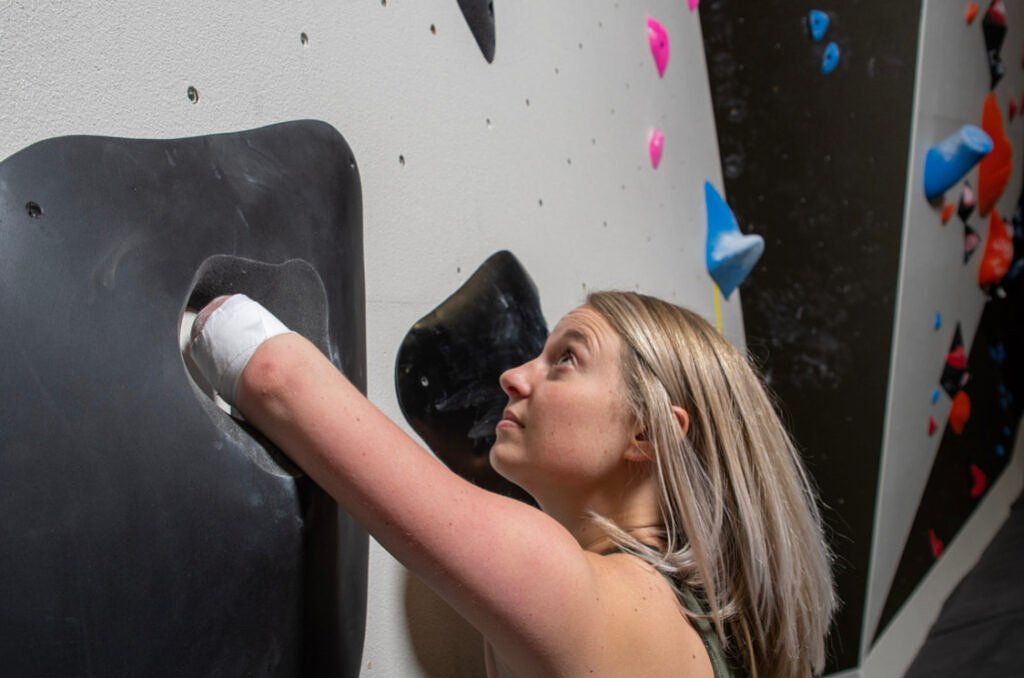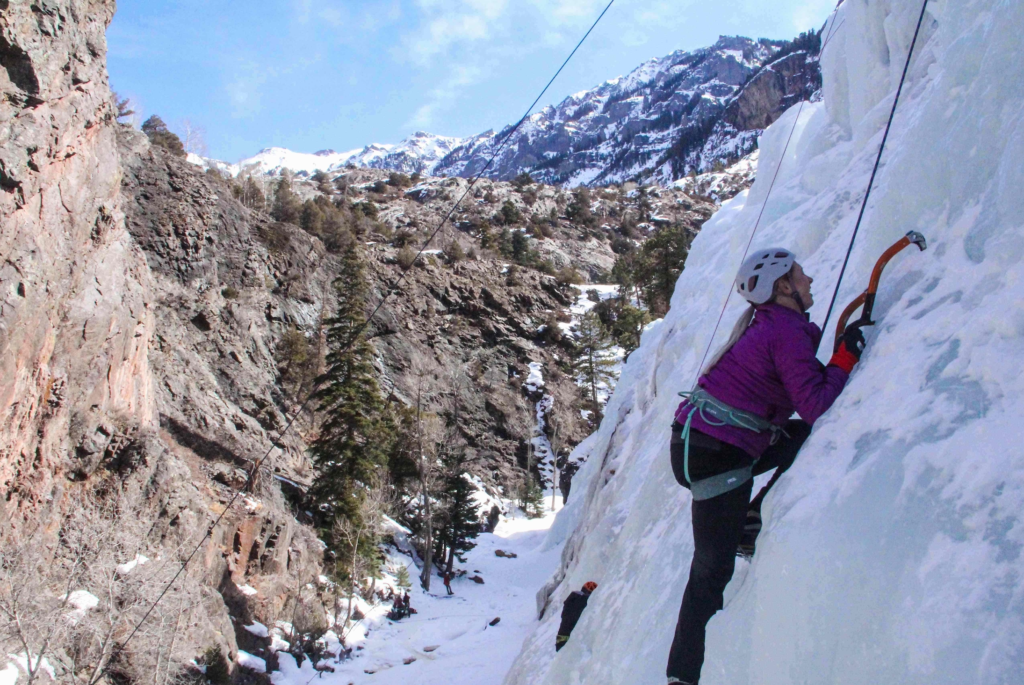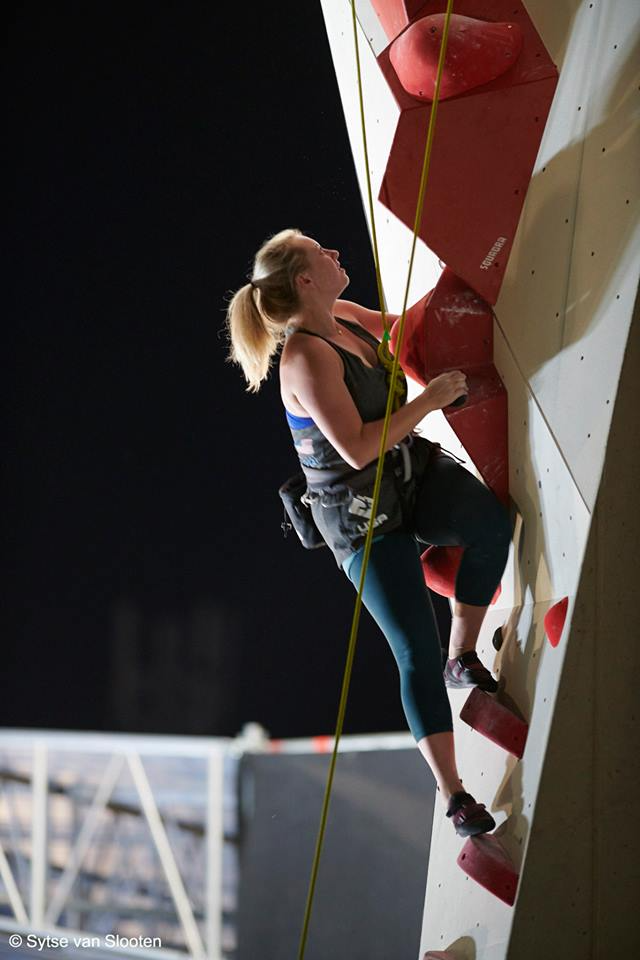KAITLIN HEATHERLY IS HER OWN GREATEST COMPETITOR
When Katilin Heatherly went rock climbing for the first time, everything hurt.

Posted on Thu 29 Oct 2020 · by Elle Biesemeyer
When Katilin Heatherly went rock climbing for the first time, everything hurt. “I feel horrible physically so that’s got to be a good thing, right?”
Kaitlin arrived at the 2018 National Paraclimbing Championship only five months after beginning her climbing journey. There, she placed fourth and qualified for the World Championship. And that is where we hear her most quoted line from the short film Dead Last: “I placed last in the World Championship, and I’m fucking stoked about it!”
Kaitlin is no stranger to the outdoors.
Growing up, she went to a summer camp in the mountains of North Carolina for similar limb-different youth where she began horseback riding, whitewater rafting, and ziplining. “It was probably the best thing my parents ever did for me,” she says. Camp was the first time Kaitlin was able to understand her capabilities. She had often felt that because of her limb difference, she wasn’t allowed to have certain experiences. “We are conditioned to think outdoors are for active, able people,” Kaitlin says. Love, joy, and the outdoors seemed to exclude her. Being surrounded by other campers with similar life experience, who didn’t question her place or ability, made her annual week at camp her favorite week of the whole year.

Kaitlin ice-climbing.
But even at camp, Kaitlin felt out of place. Most other campers had lost their limbs—most often their legs, whereas Kaitlin was born without her left hand. “I felt like I belonged, but I was still a subgroup.”
“I feel horrible physically so that’s got to be a good thing, right?”
Then, in 2017, Kaitlin went on a retreat in Moab, Utah with SheLift, an organization that empowers women with physical differences through the outdoors. Serendipitously, all the other women were also missing their hands. Surrounded by women like her, some of whom had never met other people with limb differences, the outdoors really became a part of Kaitlin. When it came time to rappel, she realized “I have a fear of heights but I can get over it to do something really cool.”
And so Kaitlin became a climber. She began to climb in gyms in Georgia, but after getting a taste of the West while in Utah, she knew she had to make the move. Nearly all of the other climbers in her gym in Georgia were able-bodied, so Kaitlin sought out the thriving community of adaptive climbers in Colorado. And only a year after the SheLift retreat, she found herself on a plane to the paraclimbing World Championships in Austria and the star of a short documentary, and now, an ambassador with Paradox Sports
The best thing that able-bodied climbers can do for Katilin is—shocker—treat her like a human.
She is a climber like anyone else in the gym, not a miracle or an anomaly. In Georgia, other able-bodied climbers sometimes seemed shocked to see her in the gym, making her question her place there. Once, a man even noticed her struggling on a route, put a hand behind his back, and completed it effortlessly without a word.

Kaitlin on her route at the World Championships.
Able-bodied climbers and outdoor folks in general have a lot of work to do before climbing feels accessible and approachable for all. “If I get off over a really hard route and you’re like ‘damn,’ that’s fine because yeah, it probably wasn’t easy. But if I was falling on a 5.8—don’t say anything to me.”
Paraclimbing is a serious sport.
It has a thriving community of athletes around the world like Kaitlin and her adaptive climbing peers in Colorado. And it gets more serious by the minute. Kaitlin looks forward to the days in which paraclimbing is such a big sport with so many successful athletes that competitions become invitation-only. Right now, some climbers have sponsorships, but for the most part, if you want to compete in paraclimbing, you just sign yourself up.
“If it gives me anxiety, it’s probably a good thing.”
When Kaitlin climbs, she thinks of who she was before she came to climbing. And she thinks of the limb-different women who, like she did, struggle with their confidence and self-efficacy. Representation, as every adventurous woman knows, is vital. The thought of leaving our comfort zone and pursuing hard things becomes tangible when we see others like us doing the same. When she struggles on a route or starts to doubt herself, Kaitlin tells herself, “You’re kind of a role model—so get your shit together just figure it out!”
As a competitive climber, Kaitlin’s internal voice can be a bit of a bully. While she climbs, she is her greatest competitor: “Why are you falling on a 5.10? You’re about to go to Worlds!” But she is always up for a challenge and recognizes that we grow from trying hard things—and failing at them. “If it gives me anxiety, it’s probably a good thing,” she says.
Climbing has transformed Kaitlin’s relationships with the world, her body, and herself. Those messages that she internalized about the life she was allowed to have as a woman with a limb difference were replaced with confidence and self-efficacy.
When Kaitlin climbs, everything clicks.
Her body moves as a unit, fluid and meaningful. She has begun to notice her body—how it looks, how it feels, and most importantly, what it can do. She squashes negative thoughts about herself and her body: “I don’t really care because I did all this yesterday with this same body.” Climbing was the conduit for Kaitlin to develop a positive relationship with her body and affirm her innate strength.
Kaitlin has a name for how challenges like climbing feel: “type 2 fun.” In the moment, it hurts, it’s hard, you hate it, and you want to quit. But by the time you rappel back down, you’re exhilarated. You feel unstoppable and emerge with a newfound confidence that not only can you climb but you can climb something even harder next time.
Being an adventurous woman means embracing type 2 fun for how it transforms us. We accept opportunities to challenge ourselves because we know we will grow. Everyone deserves to have these opportunities in the outdoors, and it is our job as adventurous women to build inclusive, welcoming spaces for all women. Kaitlin got eighth place out of eight places in the World Championships. But she still won by overcoming the barriers she set for herself and getting out of her comfort zone. Follow Kaitlin Heatherly on Instagram and be sure to watch her short film, Dead Last.